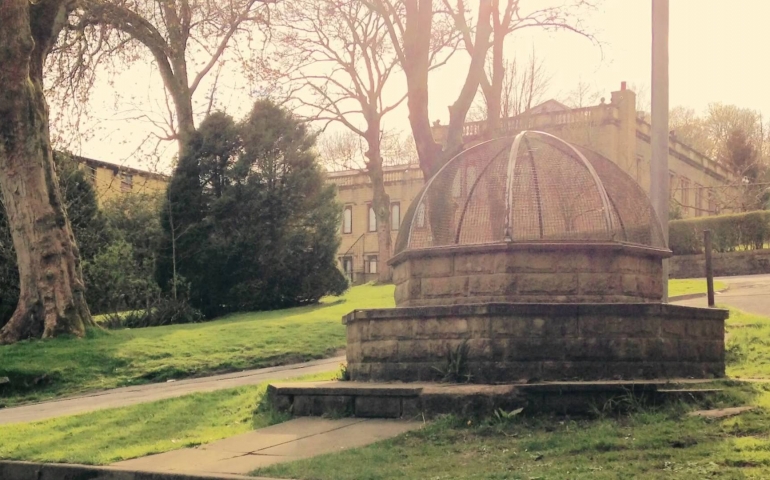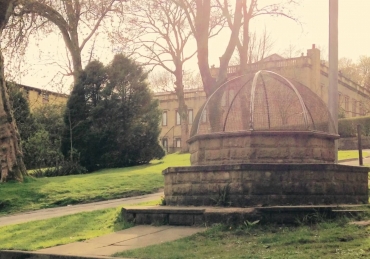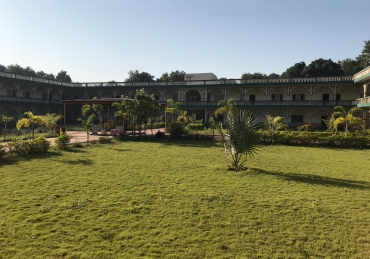Obituary: The ardent bibliophile Shaykh Muḥammad Deedat (1380/1960 – 1439/2018)
“Muḥammad Dīdāt is ʿAllāmat al-Kutub (master of books), he has fallen ill, it is difficult to find such people, people will recognise his worth after he passes away.” (Shaykh Muḥammad Yūnus Jownpūrī)
“I saw Mufti Muḥammad Taqī ʿUthmānī on three separate occasions in recent years kiss the forehead of Shaykh Muḥammad Deedat.” (Yusuf Shabbir)
It is with deep grief and regret we received the news this morning at 5am of the demise of our family friend and one of the world’s experts on books and manuscripts Shaykh Muḥammad Deedat whose knowledge and insight was acknowledged and commended by the likes of our teachers Muḥaddith al-ʿAṣr Shaykh Muḥammad Yūnus Jownpūrī (d. 1438/2017) and Shaykh al-Islam Mufti Muḥammad Taqī ʿUthmānī (b. 1362/1943) among others. The passing away of such a gem and a very close family friend is a great loss. A brief overview of his life, based on the information available to me, and some memories are outlined for the benefit of readers.
Shaykh Muḥammad Deedat was born on Thursday 18 August 1960, which corresponds to 25 Ṣafar 1380, in Zambia. He completed the memorisation of the Qurʾān in India (as I understand) and thereafter graduated in Islamic studies from Darul Uloom Bury in 1982. His class colleagues include our respected teacher Mufti Sufi Muḥammad Ṭāhir Wādī (b. 1376/1957) who sat next to him. He studied Ṣaḥīḥ al-Bukhārī with Shaykh Islām al-Ḥaq (d. 1416/1996), Ṣaḥīḥ Muslim with Mufti Shabbīr Aḥmad (b. 1376/1957), Sunan al-Tirmidhī with Shaykh Yūsuf Motālā (b. 1366/1946) and other books with other teachers. During his initial years in the UK, he resided in Hope Street in Dewsbury and also led Tarāwīḥ Ṣalāh there at a time when there were not many Ḥuffāẓ. He was a very a good Ḥāfiẓ of the Qurʾān and had a special attachment with it. Later, he moved to Preston.
A few years after his graduation, he was appointed as a librarian (and a Ḥifẓ teacher for a short period) in Darul Uloom Bury, a role which he fulfilled diligently with full devotion and commitment until a few years ago when his health deteriorated significantly. During this period, he developed an enviable passion for books and acquired a wide range of published books and manuscripts for the library. It is worth noting that he developed this passion and acquired this expertise in the pre-internet age. Shaykh would visit libraries in different parts of the world and write letters to scholars and librarians making enquiries and obtaining books and manuscripts. During a visit to Darul Uloom Bury, the Head-Mufti of Darul Uloom Deoband Mufti Ḥabīb al-Raḥmān Khayrābādī (b. 1352/1933) commented that although the library in Darul Uloom Deoband has more books in terms of quantity, the Darul Uloom Bury library has more tanawwuʿ (variety). The late Qāḍī Mujāhid al-Islām Qāsmī (d. 1423/2002) commented during a visit, “This is the place to undertake some writing.”
Shaykh Muḥammad Deedat’s insight and knowledge of books was such that some of the world’s leading scholars showered praise on him. Shaykh Muḥammad Yūnus Jownpūrī (d. 1438/2017) would consult him and acknowledge his knowledge. Over the past few years, when visiting the UK, Shaykh Muḥammad Yūnus Ṣāhib would visit Mawlānā Muḥammad Deedat and encourage the management of Darul Uloom to maintain relations with him. In Shaʿbān 1438, on Shaykh’s final visit to the UK, I heard Shaykh remark, “Muḥammad Dīdāt is ʿAllāmat al-Kutub (master of books), he has fallen ill, it is difficult to find such people, people will recognise his worth after he passes away.” A true prediction indeed. Once Shaykh Muḥammad Yūnus Jownpūrī suggested to Shaykh Yūsuf Motālā to increase his wages as he will not find anyone like him with so much knowledge of books. A few years ago, when Shaykh Muḥammad Yūnus Jownpūrī visited the library, he commented that, place all these authors on one side, and Imam Bukhārī will supersede them. He then said, “aur hamārey pās tow ʿajīb shakhṣ Molwī Muḥammad thā” (we had an incredible person, Mawlānā Muḥammad!).
Another leading scholar Shaykh Muḥammad Deedat had an excellent and historic relationship with is Shaykh al-Islam Mufti Muḥammad Taqī ʿUthmānī (b. 1362/1943). Both would communicate with each other via letters in the 80s and 90s. Mufti Muḥammad Taqī ʿUthmānī makes reference to this in Dunyā Mare Āgey (p. 269). He writes, “Our very sincere friend Mawlānā Muḥammad Deedat Ṣāḥib, is the manager of the library of Darul Uloom Bury, who has for many years maintained an affectionate relationship with me. He has a special passion for books. Through his affection, he periodically sends me new books or copies of manuscripts. He sent [in this trip of mine to Oxford] with Mawlānā Ibrāhīm [Rājā] the handwritten excellent commentary of al-Maṣābīḥ by ʿAllāmāh Tūrībishtī [d. ca. 660/1261] which has not been published to date. This was a great bounty for me.” [The book has since been published.]
Over the past few years, I have been fortunate to accompany Mufti Muḥammad Taqī ʿUthmānī during his visits to the UK. I realised the extent of the relationship and the affection that existed between them, when I saw Mufti Ṣāḥib kiss Shaykh Muḥammad Deedat on his forehead, not once or twice, but thrice on separate occasions, twice at his residence in Preston and once at the house of my respected father Mufti Shabbīr Aḥmad Ṣāḥib. My respected father reminded Mufti Mūhammad Taqī ʿUthmānī that on one occasion in the late 80s or early 90s, Mawlānā Muḥammad Deedat wrote to Muftī Ṣāḥib requesting him to travel less and instead focus on completing Takmilat Fatḥ al-Mulhim!
My respected father Mufti Shabbīr Aḥmad had a very close relationship with Shaykh Muḥammad Deedat and his family from his days of studying at Darul Uloom Bury until his demise. He commented after his demise, “Mawlana Muhammad Deedat had a very close attachment with the Qurʾān. He would collect me from Blackburn for many years and drive me to Darul Uloom Bury. He would recite the Qurʾān on the way and this was his daily routine. I am indebted to him. Whenever I required a book or a reference, he would be my first point of call. He had a lot of Ṣabr (patience). Whenever I visited him over the past decade and asked about his health, he would say: al-Ḥamdulillāh. He would not complain. Sometimes I would think, he is in so much pain, yet he is content and simply praising Allah Almighty. His one taḥmīd is better than many years of worship.”
Mufti Shabbīr Aḥmad also said, “You will not find any scholar in the UK with such a dedication for books. This was all for Islam and for the pleasure of Allah Almighty.” He adds, “Arab mey koi howgha, leykin hamārey Hindustān mey unkey jeysā koi nahī mileygā” (Maybe there is someone among the Arabs, but in our India, you will not find anyone like him). He adds, “People complain after a little bit of pain but he went through so much pain and hardship, yet would always say al-Ḥamdulillāh even in his final moments. I think these were his final words.” He adds, “He had ʿIshq (love) with the Qurʾān, he would always recite it whilst travelling to and from Darul Uloom. He had sincere love for Darul Uloom and its students.”
Despite being an ocean of knowledge, Shaykh Muḥammad was extremely humble, kind, affectionate, and humorous. He was an immaculate person, dressing in the best clothes and staying neat and up to date. I am also indebted to him. We would travel in his car to Darul Uloom Bury. Later, whilst studying the final years, he had granted me unlimited access to the library and I benefited a great deal. He would often find books for me and later as he fell ill, he would ask me regarding new books that were published. I recall, prior to this, in the year 2002, we visited Turkey and saw a manuscript of the commentary of Ṣaḥīḥ al-Bukhārī by the Ḥanafī scholar ʿAllāmah ʿAjlūnī (d. 1162/1748), who ʿAllāmah Ibn ʿĀbidīn (d. 1252/1836) refers to as the Shāriḥ (commentator) of the Ṣaḥīḥ. When we mentioned this to Shaykh Muḥammad Deedat, he immediately extracted the details of this book from various sources. (As far as I am aware, this commentary has not been published to date).
In 1995, we travelled as a family to Turkey and Shaykh Muḥammad Deedat also accompanied us. When we arrived at the famous Sulaymaniyah library in Istanbul, the doors had closed. Shaykh Muḥammad had tears in his eyes and he cried. At this point, my father urged our Turkish friend to try his utmost best to secure access to the library. Eventually, we succeeded and we were able to see the large handwritten Qurʾān and other manuscripts. Likewise, in 1997, Shaykh Muḥammad accompanied us during our tour of India. There were also numerous other occasions when we would be together in ʿUmrah in Saudi Arabia. Shaykh Muḥammad would spend most of his days touring the libraries.
Shaykh Riyāḍ al-Ḥaq narrates that he travelled to Syria with Shaykh Muḥammad Deedat. Shaykh Muḥammad had prepared a list of books he wanted to acquire. They visited several bookshops but could not find the books. Eventually, they were advised to visit an elderly Christian who may be able to assist. When they arrived and presented the list, the Christian was amazed by the list and commented that the person who has prepared this list is an ʿAllāmah.
It was during my final year of studying in Darul Uloom Bury in 2005 or around this period that Shaykh Muḥammad Deedat was diagnosed with MS (multiple sclerosis). His health started to deteriorate albeit gradually. Nevertheless, he continued to provide his services to the library for the next few years, attending regularly and continuing to develop the library. Subsequently, he reduced his attendance, and since the past few years, he was unable to continue in his role. This did not stop him from his life long passion of books. Whenever we would visit him, he would ask about new publications, even in the recent two to three years when he was predominantly bedridden. In fact, my father relayed to us that a few days ago when he fell extremely ill, he mentioned to Shaykh that a new version of Mirʿāt has been published. My father asked him, whether he knew about the subject matter of the book? He immediately replied, it is the commentary of Mishkāt al-Maṣābīḥ. He said this at a time when his illness was such that he did not even recognise a son in law of his.
“Every soul has to taste death”, the Qurʾān reminds us repeatedly. I was in India last week visiting various charity projects when my father Mufti Shabbīr Ṣāḥib text me on Wednesday 3 January 2018 that he is in hospital with Shaykh Muḥammad because he is extremely ill. Shaykh stayed in hospital for a few days and upon my return I visited him a few times. My father spent many hours with him in hospital during the past week. Yesterday, it was decided after consulting with the doctors, to bring Shaykh home as the doctors were unable to provide any further medication. Thus, Shaykh was brought home yesterday and in the early hours of the morning at approximately 4.45am, his soul left this world.
Shaykh Muḥammad’s Ghusl took place at Jamia Masjid Preston at approximately 10.30am and was attended by many scholars. The Janāzah Ṣalāh took place at Preston Cemetery at 2.15pm and was led by Shaykh Yūsuf Motālā Ṣāḥib. The recitation at the grave and duʿā was undertaken by Mufti Shabbīr Aḥmad Ṣāḥib. Scholars had travelled from as far as Scotland and London to partake in the Ṣalāh. May Allah Almighty shower His infinite mercy on Shaykh Muḥammad Deedat and grant him an abode in Jannah. May Almighty Allah enable students and scholars to benefit from the seeds he sowed and reap the fruits of the library at Darul Uloom Bury. We pray to Allah to protect the institution and take it from strength to strength.
Shaykh Muḥammad Deedat leaves behind one son Mawlānā Ḥammād Deedat, four daughters, eleven grandchildren and his wife. I have personally observed the immense Khidmah the family undertook over the past decade and also prior to this. May Allah Almighty reward them and bless their progenies. Shaykh also leaves behind his father who is elderly. He attended Janāzah Ṣalāh.
Shaykh’s wife confirmed that in recent years, Shaykh was only given ZamZam water to drink. Our respected teacher Shaykh Muḥammad Yūnus Jownpūrī also spent the final years of his life only drinking ZamZam water.
The demise of this legendary bibliophile, unsung hero and hidden gem is a great loss for the Ummah. Students of knowledge and scholars will sense the loss all the more.
Many completions of the recitation of the Qurʾān have already taken place both locally and at Darul Uloom Blackburn and other places. Our respected teacher Shaykh Muḥammad Yūnus Jownpūrī would regularly stress that along with the physical acts of worship such as the recitation of the Qurʾān, it is of paramount importance to benefit the deceased through Ṣadaqah, as understood from the ḥadīths. Accordingly, upon the instruction of my father, we have decided to launch a Ṣadaqah Jariyah project which will entail the building of a Masjid and Madrasah in Malawi, details of which are available on this link. Contributions can also be sent to us directly or via any of the teachers of Darul Uloom Bury or Mawlānā Ḥammād.
We pray to Almighty Allah to enable the successful completion of this project and make it a means of reward and mercy for Shaykh Muḥammad Deedat.
Yusuf Shabbir
Wednesday 23 Rabī al-Thānī 1439 / 10 January 2018
The Blessed Bibliophile by Mawlana Mohammed Amejee
‘Where can I find a book on the travels (rihlah) of Ibn Batuta please?’ I asked him with some trepidation. I had every right to be fearful – after all, I had just joined the seminary and the infamous Head Librarian’s reputation preceded him. ‘Don’t ever ask to borrow books when you meet him’ advised one student with a seriousness of a doctor sharing a fatal diagnosis. ‘If he catches you misplacing a book, you’re in big trouble’ quipped another whose facial hair was a patchwork of the scraggly and the tousled. ‘The books are like his children’, helpfully explained a friend. I prompted him further, eager to learn more. ‘I would advise you not to visit too often at first, then slowly build up a relationship. Introduce yourself but don’t ask too many questions. Do that and you stand a chance of avoiding his ‘Black List.’ ‘Black List?’ I quivered in painful anticipation of what was to come. His response did not disappoint: ‘It’s a list of pupils- and rumour has it some staff- who have been banned and dare not access the library.’
I began to have second thoughts about visiting the library now. I had heard it was a treasure cove of books and manuscripts on the Islamic sciences, particularly in Arabic. A collection so meticulously compiled over decades that it became the resource library for serious students, researchers and academics. From ‘Ayni and Arberry to Zabidi and Zohar via Suyuti and Schacht- it had it all. But I was in rural Lancashire, where distractions comprised the not-so-local Kwiksave and the odd grazing cow, so eventually, a mixture of curiosity and youthful exuberance got the better of me. During one lunchbreak, after devouring that afternoon’s oil-laden chicken curry and scrumptious fresh rotis, I took the long walk down the seminary’s main corridor to the library entrance. The latch was open. I mustered up the courage to enter. Gently. My attempt at a cough to alert him of my presence failed miserably and what emerged sounded like the pitiful wheeze of an asthmatic cat. I ventured forward, and with every step, absorbed the aesthetic joy of the ceiling-high, mahogany-lacquered shelves bursting with books in every nook and cranny. The titles of larger volumes were embossed in gold cursive Arabic script on the spines and shimmered in the light, tempting the passing potential reader with the greater delights of what lay within. I sensed a movement. My eyes quickly focussed on the person approaching.
Before me stood a portly, indistinguishable man in a long cocoa-coloured thobe with a pristine white topi angled to the right almost beret-like. It looked as though it had lolled to one side with an impromptu head scratch in response to a difficult question rather than placed there with any great intent. The man wore large thick-rimmed spectacles with dark lenses tinted enough to make it difficult to see through- a metaphor for what to come perhaps? He sported an impressive bristly full beard with the odd grey hair catching the light much like the books surrounding him. I looked down, unable to maintain my gaze. My eyes momentarily fell on his black socks with a patch of bright blue at the heel. It was conspicuously emblazoned with ‘Next’. I broke the uncomfortable silence with a hastily-conceived question: ‘Where can I find a book on the travels (rihlah) of Ibn Batuta please?’ I asked somewhat apologetically. ‘Who?’ he answered quizzically with a loudness that would have unsettled the dust resting on a distant bookshelf. ‘I’ve never heard of him!’ he exclaimed in surprise. ‘You know, Ibn Batuta, the famous Moroccan explorer, travelled further than Marco Polo?’ I replied, taking his bait. He shook his head in dismay and moved to turn away. I turned around in disappointment. ‘Such a great library and they don’t even have the Rihlah!’ I naively thought, engulfed in self-pity. My introspection was quickly brought to a premature end when I felt the sting of a hearty slap on my back. I turned around confused. He had a grin on his face and gestured to a shelf not too far away from us. I shuffled nervously in that direction and found the Rihlah nestled exactly where he suggested it would be. And, momentarily at least, I forgot the oddity of our encounter.
I visited the library again the next day, only this time I didn’t ask any questions. My brief visit was thankfully uneventful and as the days passed, the library became my staple dessert at lunchtimes and I slowly began to familiarise myself with its bountiful riches. It was very modest in meterage, but what it lacked in size it more than made up for in quality. It was a light welterweight taking on the heavyweights of the Bodleian, Chester Beatty and the great British Library. It had books stuffed into every crevice and the endless supply, gleefully unpacked by the Head Librarian, would find space somewhere in library’s burgeoning belly. The systematic and thematic ordering of books was par excellence, and made all the more remarkable by the fact that it was almost entirely done manually with no formal electronic cataloguing. It was the culmination of decades of painstaking work by its expert craftsman, its Head Librarian. Its only librarian. I would later learn he had selflessly traversed the globe attempting to satiate his insatiable appetite for the latest and rarest prints of books on the Islamic sciences. Where this was not possible, he would write to publishing houses directly and request them. Securing the latest book title would be akin to winning the league title and anything less sometimes left him in tears of relegation. The library he single-handedly built became the academic watering hole for professional researchers from Oxford, to the Muslim star scholars of the Indian subcontinent.
Since our first, somewhat unconventional encounter, I deliberately avoided having to bump into the Head Librarian for a few days. However, in the small, intimate library, our paths inevitably crossed when one day I found myself at an impasse in a one of the library’s narrow aisles. He looked in my direction and with a grin one can only describe as radiant and infectious, he said: ‘Hey! Don’t steal my books!’ I eagerly grinned back. Over time, our encounters became more frequent and jovial, and on occasion, I would tap into his encyclopaedic knowledge to find an obscure publication or print. In return, he would sometimes ask me to escort visiting primary school children on a RE trip around the library, whilst he burrowed behind a desk or an even a large stack of books. It was however, when I found a secret stash of mini Pepsi cans carefully hidden from view behind a copy of al-Tusi’s Kitab Adab al-Muta’allimin (Book of Manners for Students) that our relationship really grew. He offered me a can and at that point he became not just the Head Librarian but my Head Librarian. Like most people at the seminary, I referred to him as Mawlana (lit. our master. A cultural term of scholarly respect); it did no justice to his scholarly rank. For the first time, I felt comfortable teasing him gently about his socks or asking him – in jest- if he’d lend me his latest book. I feared retribution, but none came. For behind the eccentric, inimitable exterior, lay a gentle, warm soul. Through his amusing self-deprecation he not only exhibited his humility, but skilfully masked his own brilliance and piety. He was a mountain of a man.
As I stood over his grave yesterday (10/01/2018), I waited until the multitude of tearful mourners had all left. We were both alone. I stared down at the freshly dug clay, a resplendent burnt umber. The winter winds sighed a gentle, chilly breeze but I was soon freed from her cold embrace. I was warm again. I was with him. Momentarily. I stared at the two bright green fresh stalks placed at either end of his grave, protruding like two hopeful springs. How apt I thought. They will- God willing- one day grow into paper-laden trees and he would have nourished them. I reflected on the Mawlana’s greatest battle over the last decade: not incessantly replenishing his beloved library’s stocks, but something far more sombre- his deteriorating health. When the diagnosis of multiple sclerosis was confirmed almost a decade ago, his battle strength with the debilitating and ultimately crippling illness ebbed away much like the binding on an ancient volume beset with bookworm. I marvelled at his closest friend and teacher, the incredible Mufti and his wife who faithfully and unceremoniously for many years spent countless hours at his bedside trying to raise his spirits. Their friendship was true friendship, not the superficial Facebook kind. Their love was as deep as the Mawlana’s love was for his books. Their supplication for him at his graveside was as sincere and moving as any supplication could be. I grew in admiration for the Mawlana’s dutiful family, his angelic wife, his son, four daughters, and the rest of his family all of whom had served and nursed him on many a dark night. I thought about what the Mawlana’s father was thinking when he realised he had outlived his son.
I sighed and began a slow, reluctant walk away from his grave back to my home- a mere temporary home in this short life. I stopped after only a few yards and turned around. I was hoping he would call out to me… but no voice came. If Heaven has a library, then the Mawlana would surely be its Librarian. And if you have the good fortune of seeing him there, please convey my heart-felt regards. Tell him I miss him. Tell him I love him. Tell him, because I failed to. I had planned to meet him this Sunday; alas death waits for no man.
Reflections of Mawlānā Amir Isap, Preston
Many will have heard of the passing of Mawlana Muhammad Dedat Sahib, a scholar who has impacted our lives in many different ways. For many, he will be remembered as the extremely knowledgeable librarian of Darul Uloom Bury, for others, like myself, he will be remembered as the giant of a teacher who hid his knowledge and piety behind a veil of simplicity and smiles, but one thing is for sure, very few of us recognised his worth.
For many of us, our earliest experiences of Mawlana Muhammad Dedat Sahib are as a student in maktab, his relationship with his students was one of a friend and companion, he would jest with us and laugh with us, but the correct and authentic Islamic education was always his primary motive and purpose.
Little did we know that some of the most prominent scholars have benefited from him and his vast knowledge, when I asked Mufti Shabbir Ahmed (teacher of hadith in Blackburn) to tell me something regarding the great scholar, he sighed and said heavily, ‘Aah, what can I tell you about him, where do I even start? Shaykh Yunus RA referred to him as ‘allaamatul kutub – a master of books’.
The likes of Mufti Shabbir Sahib, Shaykh Yunus Jhonpuri RA (former teacher of hadith in Saharanpur), Mufti Taqi Uthmani (teacher of hadith in Karachi), Mufti Habibur Rahman (the grand Mufti of Deoband) and Mawlana Yusuf Motala (teacher of hadith in Bury) were some of the scholars who had recognised his scholarly prowess and had taken direct benefit from him, whether it be in the sourcing of a rare manuscript or book, whether it be from his ocean of knowledge or even his good company.
His piety was known to those closest to him, he had a special relationship with the Quraan; his daily journey from Preston to Bury was filled with the recitation of the word of Allah, he was known for his love for the Quraan and this would show even more in the blessed month of Ramadhan, one of his most salient features which serves a lesson for us all is his punctuality of the Fajr prayer in congregation, whether ill, tired or weak, it would pain him to miss the prayer in congregation.
When I visited him for the last time, the pain was visible on his face, yet he still found the strength to smile, upon enquiring of his health, he uttered the single word he always answered with, ‘alhamdulillah’ – all praise be to Allah, may Allah flood his grave with mercy.
Amir Isap






40 Hadiths on the love of the Prophet with detailed commentary (New Book Release)